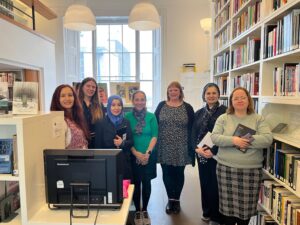GEM Conference 2022 // Why work-based learning is wonderful: apprenticeships and diversifying the museum workforce
“I just really like the idea of learning, but also being paid like that’s kind of the dream. It is a really good balance between learning new skills, but also using my previous skills and then also doing an actual job. You get more out of an apprenticeship. You get experience, real life experience, not just education, which for me works perfectly”.
Jessie Forbes, LIAS apprentice at Guildford Library
I love teaching and working with apprentices in museums, galleries, libraries and archives. I get to meet and work with lots of wonderful learners who come from a range of backgrounds, range in age from those in their early 20’s to late 50’s and are at different stages in their working life. As Course Leader for Apprenticeships in the Cultural and Creative sectors at Westminster Adult Education Service (WAES) I work in partnership with organisations like Tate, British Library, National Gallery and the Imperial War Museum. Apprenticeships provide a wealth of opportunities to join the cultural sector. They are a practical approach to learning and are an alternative to more academic routes. I think the museum and heritage sector needs to embrace and champion more diverse routes people can take to find work in museums, libraries, archives and heritage sites.
Work-based learning and apprenticeships programmes are a great way to diversify our workforce and offer opportunities for people to train, whilst working, so they can offer new skills, experiences and offer new perspectives. At WAES, I currently deliver the Libraries, Information and Archives Services Assistant, Cultural Learning and Participation Officer and Museums and Galleries Technician apprenticeships. It is an exciting area to work in. But how does it all work? Apprentices are employed in a role within a cultural organisation full time for between 15 – 18 months. Whilst they are on programme, they also complete 20% off the job learning with regular taught sessions at college, where we explore the criteria and content they need to cover for their apprenticeship. All apprenticeships are now End Point Assessment, meaning that most require apprentices to work on a portfolio of evidence to collect and collate throughout their apprenticeship, which they then present to an Assessor at the end of the programme. There is also usually a work project that apprentices need to complete and write up in a report. What I think is particularly exciting for museum education is that there is a currently a new Cultural Learning and Participation Officer apprenticeship (CLPO) aimed at those who plan, organise and co-ordinate artistic and cultural education workshops, schedules of activity and community engagement projects. We would love to hear from you if you would like to find out more about this apprenticeship and work with us. There is a useful guide from Creative and Cultural Skills outlining best practice in setting up apprenticeship here for more information. For more information about apprenticeships at WAES and how you could partner with us, contact me Jenny Pistella, Course Leader for Apprenticeships in the Creative and Cultural sector at WAES [email protected]. https://www.waes.ac.uk/department/apprenticeships

Library, Information and Archive Services Assistant apprentice class visiting the Weiner Holocaust Library, Russel Square.
Follow WAES at Twitter @WAESonline, Instagram @waesonline https://www.waes.ac.uk/
 Jenny Pistella is a Cultural Heritage Learning specialist with experience of working in public engagement and teaching museums, libraries and archives studies at Further and Higher Education. She is passionate about supporting the next generation of museums, galleries and heritage professionals and diversifying the workforce. Jenny has over 15 years’ experience working in cultural organisations such as Historic Royal Palaces, V&A, UCL Museums and Culture&. She is currently the Course Leader for Apprenticeships in the Cultural and Creative sectors Westminster Adult Education Service.
Jenny Pistella is a Cultural Heritage Learning specialist with experience of working in public engagement and teaching museums, libraries and archives studies at Further and Higher Education. She is passionate about supporting the next generation of museums, galleries and heritage professionals and diversifying the workforce. Jenny has over 15 years’ experience working in cultural organisations such as Historic Royal Palaces, V&A, UCL Museums and Culture&. She is currently the Course Leader for Apprenticeships in the Cultural and Creative sectors Westminster Adult Education Service.
